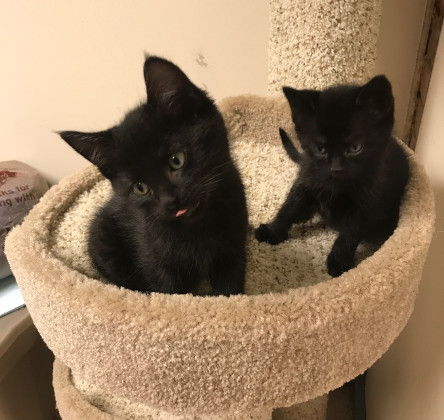
Caring for
Your
New Kitten
Congratulations on your new kitten! The doctors and staff at Oxbow Veterinary Clinic realize this is an exciting time for you, as well as a very influential time for the health and well being of your new cat. Below is a description of common vaccinations, laboratory tests, and procedures required or recommended for new kittens. Feline Leukemia/FIV testing – Feline leukemia and Feline AIDS are viruses that can be passed to a new kitten from their mother or other cats in the environment. We recommend all kittens be tested prior to starting their vaccinations to make sure they are not infected with these deadly diseases. FVRCP Vaccination – This vaccine prevents against feline panleukopenia, herpes, and calici viruses, which cause vomiting, diarrhea, or upper respiratory problems in cats. This vaccine is given every 3-4 weeks until they are 4 months old (usually 8, 12, and 16 weeks), then is repeated in one year. Rabies Vaccination – This vaccine is required by law to prevent the transmission of Rabies – both to protect pets from wildlife as well as protecting their owners. This is usually given at 12 weeks then repeated yearly. FeLV Vaccination – Feline leukemia is an incurable disease that is spread between outdoor, unvaccinated cats. We recommend all kittens receive 2 vaccines 3-4 weeks apart (16 and 19 weeks), then should be continued yearly if they go outside and come in contact with other cats. During early kittenhood, wellness exams are recommended on a monthly basis, while for the average adult cat, annual wellness examinations are the norm, and semi-annual examinations are recommended for middle aged, senior, and geriatric cats. Fecal Testing – Many new kittens are infected with intestinal parasites before coming to their new homes. We recommend a stool sample to check for intestinal worms – some of which are not taken care of by most dewormers. Flea and Tick preventative – If your kitten will go outside (or lives with other animals that go outside) it’ll likely be exposed to fleas and ticks. These not only cause itching and allergies, but can carry diseases and also easily infest the house and anywhere the cat spends time. We recommend topical products such as Frontline (that kills fleas and ticks) or Advantage Multi (that kills fleas, heartworms, intestinal worms, and ear mites.) Cats are very sensitive to many over the counter medicines – so be careful to only use products made especially for cats – preferably from your veterinarian. Spaying/ Neutering – We recommend kittens be spayed or neutered at 6 months of age. This helps to control the large numbers of unwanted kittens that are often surrendered to shelters or left to fend for themselves. It also prevents health problems such as mammary cancer and uterine infections, and also controls unwanted behaviors such as spraying or marking. Kitty Kindergarten – Though kittens are a lot easier to train than puppies, they still can benefit from early socialization. Exposing kittens to different types of people, other animals, and new situations in the first 4 months of life can make them less fearful in the future. It’s also a good time to familiarize them with the cat carrier (try lots of treats!), as well as things such as nail trimming or even teeth brushing. We at Oxbow Vet Clinic hope to help your kitten to have positive experiences here so they’ll be happy to come back and see us as they grow up!
